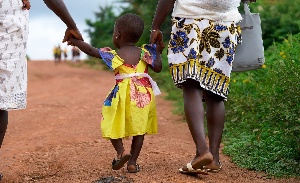Africa News of Thursday, 24 April 2025
Source: www.ghanawebbers.com
Africa: Beating Malaria - What Can Be Done With Shrinking Funds and Rising Threats
Healthcare in Africa is facing a serious crisis. There are high rates of infectious diseases like malaria and HIV. Non-communicable diseases are also on the rise. At the same time, foreign aid is decreasing.
In 2021, nearly half of sub-Saharan African countries relied on external funding. This funding covered more than a third of their health expenses. However, donor fatigue and global issues like climate change have strained malaria control programs. These funding gaps threaten progress made in fighting malaria.
The healthcare funding crisis in Africa is not new, but it is worsening. As financial support decreases, Africa's ability to combat diseases like malaria is severely tested. Malaria remains a major public health threat worldwide. In 2023, there were an estimated 263 million cases and 597,000 deaths globally.
The WHO African region was hit hardest, with 94% of cases and 95% of deaths occurring there. A child under five dies from malaria every 90 seconds on average. Since 2000, efforts to control malaria have saved nearly 13 million lives globally. Key advancements include insecticide-treated nets and rapid diagnostic tests.
However, progress has stagnated since 2017. If funding gaps widen further, Africa risks losing hard-won gains against malaria. New challenges are emerging as well.
Drug resistance and undetectable strains of the Plasmodium falciparum parasite pose significant threats. Mosquito behavior is changing too; they now bite outdoors more often. Climate change is altering transmission patterns for malaria as well.
The invasive Asian mosquito species Anopheles stephensi is spreading across urban areas in Africa. Cross-border transmission continues to be a problem alongside growing funding shortfalls.
As World Malaria Day approaches in 2025, urgent action is needed under the theme "Malaria ends with us: reinvest, reimagine, reignite." Africa must lead the fight against malaria through renewed investment and political will.
Reinvest: Prevention Is Key
Researchers and policymakers need smarter funding strategies for prevention efforts. Preventing malaria costs less than treating it after infection occurs. Long-lasting insecticidal nets cost between US$4 and US$7 each and last for years.
In contrast, treating severe malaria can cost hundreds of dollars per case. In high-burden countries like Tanzania, malaria accounts for up to 30% of disease burden.
Preventive measures are not only humane but also economically wise.
Reimagine: New Tools Are Needed
To combat future challenges effectively, we need new tools for fighting malaria. Resistance to treatments and climate-driven changes require innovative solutions now more than ever.
African nations should scale up innovations such as the RTS,S/AS01 vaccine and advanced mosquito nets while building local capacity for development and production of these tools.
Investing in research and local manufacturing will strengthen responses to this adaptive disease.
Reignite: Community Collaboration Matters
Shifting power to community health workers can enhance the fight against malaria significantly. These workers already provide testing and treatment in remote areas; they can manage other health challenges too.
Integrating malaria prevention into broader community health services builds resilience while ensuring continuity during funding fluctuations.
Every intervention delivered by trusted local health workers fosters community ownership over health initiatives.
Strengthened collaboration among partners, governments, cross-border nations, and communities is essential moving forward.
The Cost of Inaction Is High
Africa's struggle with malaria reflects deeper healthcare system issues across the continent.
By 2030, an additional US$371 billion annually will be needed for basic primary healthcare—about US$58 per person.
For just this year (2023), US$8.3 billion was required for global control targets but only US$4 billion was raised.
This gap has widened consistently since 2019.
Addressing these shortfalls requires smarter spending focused on prevention rather than simply increasing budgets.
Collective responsibility lies with African governments to invest boldly while reforming policies that prioritize prevention.
Global partners should support without overshadowing local efforts.
Communities must be empowered to take charge of their own health initiatives as well.
This article has been republished from The Conversation Africa under a Creative Commons license.











